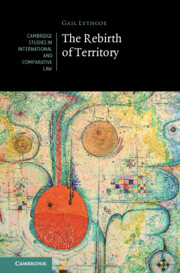Book contents
- The Rebirth of Territory
- Cambridge Studies in International and Comparative Law: 186
- The Rebirth of Territory
- Copyright page
- Contents
- Acknowledgements
- Table of Cases
- Table of Treaties, Resolutions, and Acts of International Organisations
- Abbreviations
- 1 Introduction
- 2 Deterritorialisation Discourse in International Law
- 3 Excavating the Territory of International Law
- 4 Re-imagining the Concept of Territory
- 5 Reterritorialising International Law
- 6 A New Legal Geography for International Law
- Bibliography
- Index
- Cambridge Studies in International and Comparative Law
2 - Deterritorialisation Discourse in International Law
Published online by Cambridge University Press: 07 March 2024
- The Rebirth of Territory
- Cambridge Studies in International and Comparative Law: 186
- The Rebirth of Territory
- Copyright page
- Contents
- Acknowledgements
- Table of Cases
- Table of Treaties, Resolutions, and Acts of International Organisations
- Abbreviations
- 1 Introduction
- 2 Deterritorialisation Discourse in International Law
- 3 Excavating the Territory of International Law
- 4 Re-imagining the Concept of Territory
- 5 Reterritorialising International Law
- 6 A New Legal Geography for International Law
- Bibliography
- Index
- Cambridge Studies in International and Comparative Law
Summary
Chapter 2 provides an overview and critique of discourses about deterritorialisation in international law. The first sections sketch out three main strands to these discourses. The first strand contains accounts of a fundamental transition in the organising logic of international law; a shift from ordering competences on the basis of territory to functions. The second strand groups together accounts addressing the relocation of power but containing imprecise and undertheorised understandings of these spaces. The third strand includes accounts concerning the porosity of states. The chapter then problematises these discourses. Each strand applies a similar legal-spatial imaginary, and in so doing omits the resulting spaces produced by deterritorialisation. Common to all is a tendency to continue to applying a particular and unproblematised concept of territory, limiting theoretical insight, consistently producing deterritorialisation without reterritorialisation, and often conflating at an analytical level actors, spaces, and functions. The reason for this again lies in the continuing prioritisation of the stato-centric approach to territory in international law’s implicit geography.
Keywords
Information
- Type
- Chapter
- Information
- The Rebirth of Territory , pp. 30 - 70Publisher: Cambridge University PressPrint publication year: 2024
